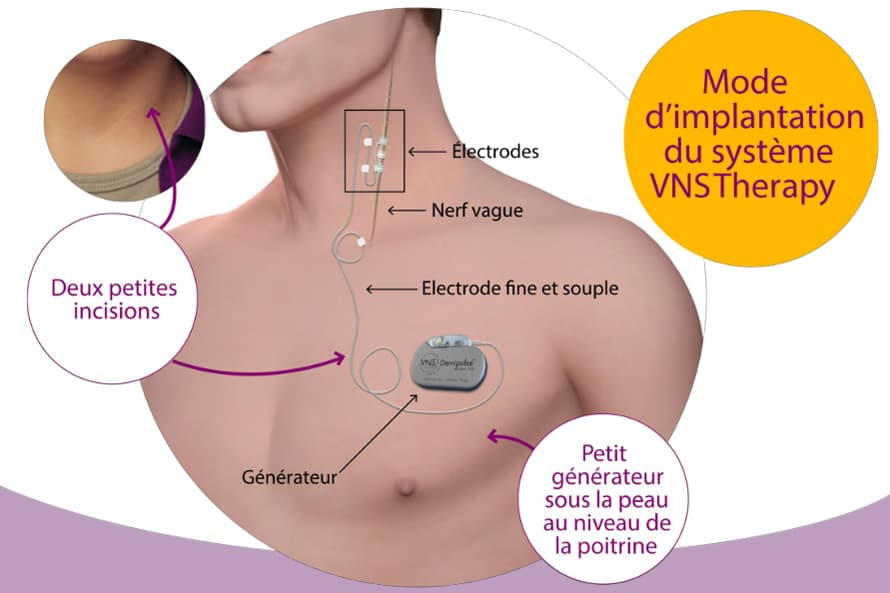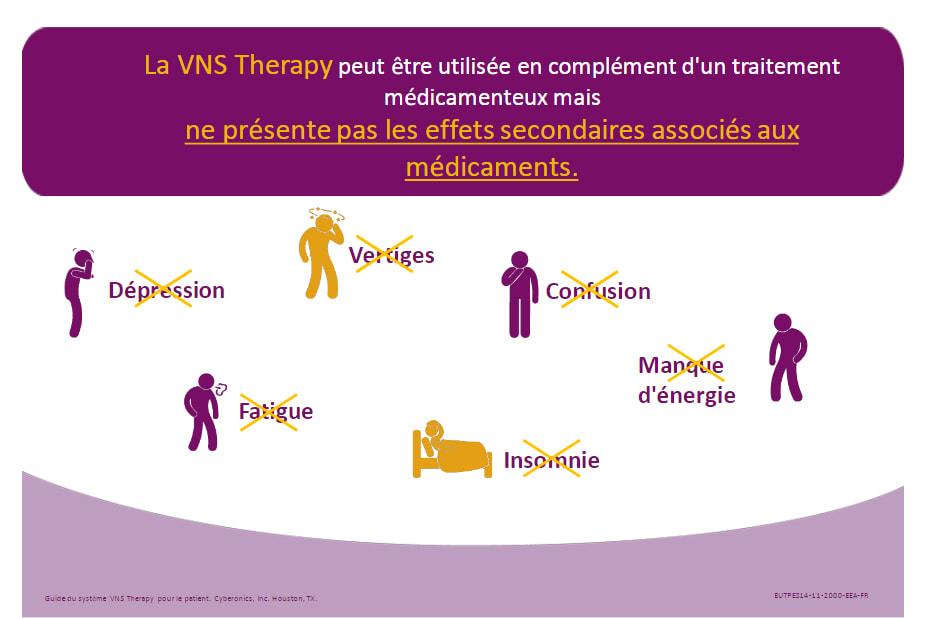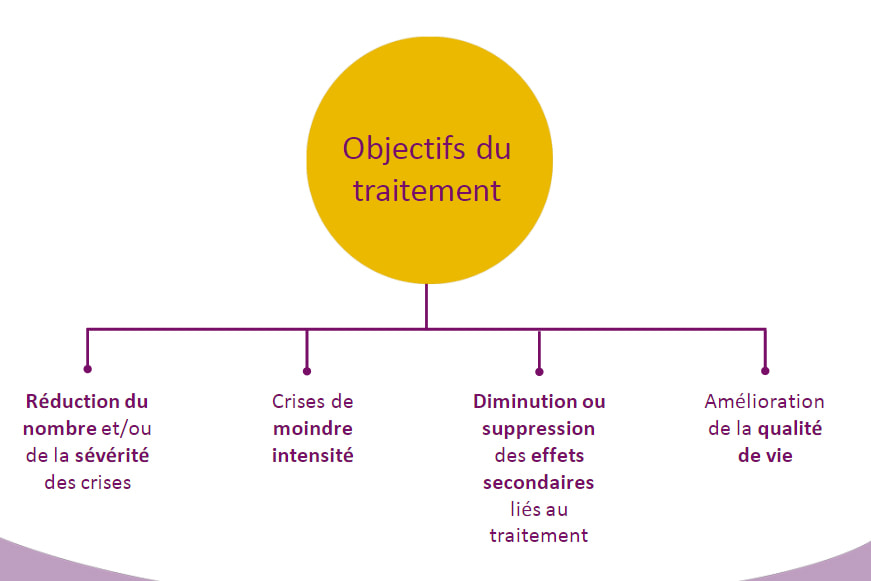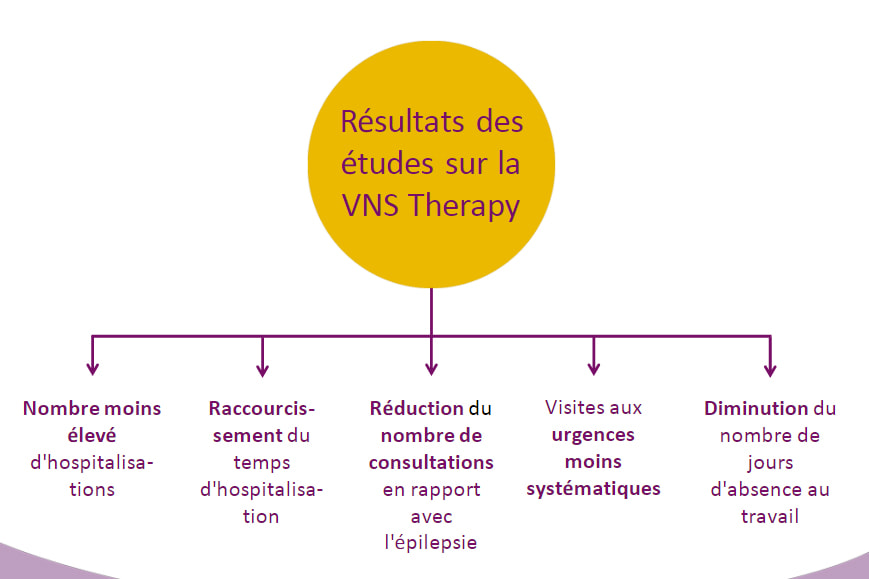Vagus nerve implant
The vagus nerve implant is a complementary/adjuvant solution to drugs that can be proposed for disabling epilepsy resistant/refractory to medical treatment in children and adults (occurrence of seizures despite taking 2 different anti-epileptic drugs).
More than 50 million people worldwide suffer from epilepsy, 35% of whom have seizures that are difficult to treat.
The aim is to reduce the number, frequency and severity of partial or generalized seizures, and if possible to reduce the doses or number of drugs booked, in order to improve quality of life by reducing side effects (depression, fatigue, insomnia, confusion, dizziness, tiredness).
The device can prevent the onset of certain attacks, shorten or interrupt them, reduce their intensity, and shorten the recovery period between attacks.
The proposal to implant a vagus nerve implant for epilepsy is made exclusively by a neurologist on the basis of precise criteria of incapacitating epilepsy despite the use of several anti-epileptic drugs. The ENT surgeon will place the implant on the left vagus nerve in the neck, as well as the connected generator-box under the skin of the chest, under general anaesthetic. He will check that it is functional while you are still asleep, but it will be the neurologist who will activate and adjust it in consultation, remotely from the operation, thanks to a box placed on the chest.
Find out more about vagus nerve implant surgery from Dr Delagranda, ENT and cervico-facial surgeon in La Roche sur Yon.
Vagus nerve stimulation therapy (VNS therapy)
The device can be used to prevent the onset of certain epileptic seizures, shorten them, interrupt them, reduce their intensity and shorten the recovery period between seizures.
The principle is to send electrical stimulation to the brain via the vagus nerve in a retrograde fashion to prevent or stop an epileptic seizure.
Over 85,000 people worldwide are fitted with this type of implant.
Please refer to the ENT College’s explanatory sheet on exploratory cervicotomy for further explanations, as there are no specific sheets on VNS placement.
Who is concerned by a vagus nerve implant?
The vagus nerve implant is a complementary/adjuvant solution to drugs that can be proposed for disabling epilepsy resistant/refractory to medical treatment in children and adults (occurrence of seizures despite taking 2 different anti-epileptic drugs).
- The neurologist determines the indication for VNS therapy.
- The ENT surgeon places the vagus nerve implant required for VNS therapy.
Please consult your specialist for further explanations.
In wich cases should I have a vagus nerve implant?
If you answer yes to any of these 4 questions, your neurologist may suggest VNS therapy:
- Are you taking several anti-epileptic drugs without controlling your seizures?
- Do your current medications cause side effects in your daily activities?
- Have you been to the emergency room or hospital on several occasions because of seizures or seizure-related injuries?
- Does the recovery time after seizures force you to limit your daily activities?
Objectives of vagus nerve implant surgery
The objective is to reduce the number, frequency and severity of partial or generalized seizures, and if possible to reduce the dose or number of drugs booked, in order to improve quality of life by reducing side effects (depression, fatigue, insomnia, confusion, vertigo, tiredness).
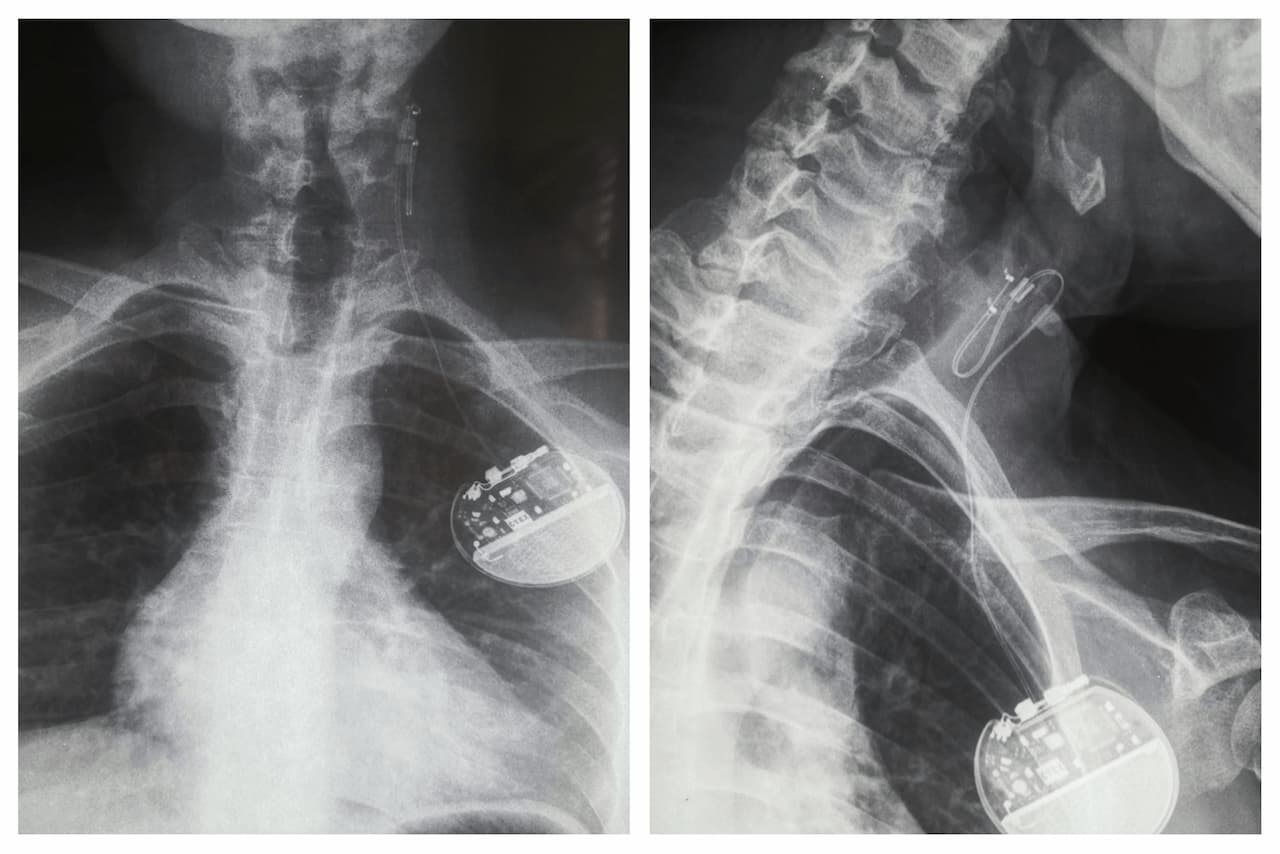
The surgical procedure
- Under general anaesthetic
- Duration= 1-2 h
- 2 scars of 5 cm, one in the neck on the left above the clavicle, one on the chest below the clavicle.
Post-surgery recovery period
- Outpatient or outpatient hospitalization, depending on the situation
- Rest at home for 10 days
- ENT consultation at 8-10 days
- Consultation with Neurologist between 7 and 15 days
- Analgesics= Class I, paracetamol. The post-operative period is painless
- Post-operative care at home: daily scar care for 8 days
- Scar: visible horizontal scar in the neck (5 cm) and on the thorax under the left clavicle (5 cm)
Complications of vagus nerve implant surgery
- Hematoma
- Surgical site infection
- Bradycardia
- The implant may also cause side effects that diminish over time (within a few weeks)
- Voice changes: hoarseness (dysphonia)
- Cough
- Hiccups
- Pain when eating (odynophagia)
- Vomiting
- Tingling in the throat
- Shortness of breath
Frequently asked questions about vagus nerve implant
Here is a selection of questions frequently asked by Dr Delagranda’s patients during consultations for vagus nerve implants in La Roche-sur-Yon.
Can I have an MRI with a vagus nerve implant?
Yes, but with certain precautions: The patient must see his neurologist, who must prepare the generator before the MRI by performing painless external maneuvers that do not require the skin to be opened, and after the MRI to check it. MRI of the thorax between the 7th cervical vertebra and the 3rd lumbar vertebra is never authorized.
Does the implant need to be changed over time?
The implant itself does not need to be changed, except in exceptional cases, but the casing connected to it should be replaced every 5-8 years, depending on the life of the battery. Case replacement surgery is quick and easy, performed on an outpatient basis and sometimes under local anaesthetic.
Are heart rhythm disorders a contraindication to vagus nerve implant surgery?
No, the implant’s self-stimulation function simply needs to be deactivated by the neurologist.
Is a pacemaker a contraindication to vagus nerve implant surgery?
No, the implant’s self-stimulation function simply needs to be deactivated by the neurologist.
Is it possible to have a child with a vagus nerve implant?
Yes
Are there any drugs contraindicated with a vagus nerve implant in place?
No.
Is the device operational as soon as it is inserted?
No, the device is activated 2 weeks after insertion at the earliest. Optimal adjustment may take longer.
Are the effects of the vagus nerve implant immediate?
No, the improvements experienced are progressive, and can last up to 2 years after placement.
Should the implant always be placed on the left?
Yes, because there are fewer side effects due to fewer nerve branches to the heart and lungs.
Is it possible to pass under airport security gates?
No, we don’t recommend it. It’s better to ask to be searched by presenting your implant card.
Do you have a question? Need more information?
Dr Antoine Delagranda will be happy to answer any questions you may have about vagus nerve implants. Dr Delagranda is a specialist in ENT surgery at the Clinique Saint Charles in La Roche-sur-Yon, Vendée.
ENT consultation for vagus nerve implant in Vendée
Dr Antoine Delagranda will be happy to answer any questions you may have about vagus nerve implants. Dr Delagranda is a specialist in ENT surgery at the Clinique Saint Charles in La Roche-sur-Yon, Vendée.


